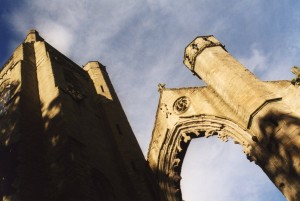 Scottish Catholic historian Tom Gallagher had something to say over at the Spectator about the way that Catholic voters voted in the recent independence referendum:
Scottish Catholic historian Tom Gallagher had something to say over at the Spectator about the way that Catholic voters voted in the recent independence referendum:
An influx of Irish immigrants restored a Catholic presence in Scotland after 1800. The overnight results show that the descendants of this community must have voted disproportionately for independence. Its remaining strongholds, North Lanarkshire, West Dunbartonshire, Dundee and, above all, Glasgow are among the few areas of Scotland that voted Yes.
Gallagher’s analysis received some sharp pushback in the comments. This, I suspect, has something to it:
What is going on is the exact opposite to what Gallagher claims. Catholics are simply ceasing to vote as Catholics and are now voting according to age, social class and perceived national identity interests…Catholics have a higher percentage of their religious group in the lower socio-economic groups and they have suffered economically. Poorer people tended to vote, more heavily for independence as they could see Britishness not offering them much.
Nevertheless, the attitude of the church itself is worth noting.
Back to Gallagher:
Some might have been expected that the Church would have steered clear of politics and even urged its flock to carefully examine each of the choices before casting a vote, especially after the stewardship of Cardinal Keith O’Brien. The former Archbishop of St Andrews and Edinburgh acted more as a cheerleader for the SNP than as a dedicated pastor keen to strengthen his church in an increasingly irreligious age [I blogged a bit about O’Brien, a less than likeable figure, here and here].
New archbishops appointed in the last few years issued anodyne statements about exercising civic responsibility while apparently turning a blind eye to a number of priests who used their pulpits to issue overt political messages.
St Mary’s Cathedral in Edinburgh even heard an overtly political talk delivered by a senior Catholic academic who had been invited to dwell on the 200-year history of the Church since its construction in 1814. The Scottish Catholic media has become a stomping ground for high-profile media and academic converts to nationalism. It is on such figures that a church hierarchy, increasingly disorientated by the loss of influence over a shrinking number of Scots-born Catholics, relies in its deliberations with the SNP administration. Silence in the face of ugly campaigning methods, or else acquiescence in order to preserve one of the church’s few outposts of influence, its extensive system of state funded schools, seems to have been the order of the day.
The following day the Spectator’s Damian Thompson reproduced the farewell message from the Roman Catholic Archbishop of Glasgow, Philip Tartaglia, to the departing Scottish Nationalist leader, Alex Salmond, a a message that included this:
With good reason, you have been described as one of the most able and influential political leaders that Scotland and the United Kingdom has ever produced.
Really?
But then comes something else. Thompson adds a screen shot of a somewhat menacing press release put out by Jim Sillars, a former deputy leader of the SNP and a man of the hard left, threatening a ‘day of reckoning’ against a number of large companies opposed to Scottish independence.
Thompson continues:
And then, underneath: ‘Notes to Editors. 1. For further information contact: Peter Kearney [phone number blacked out] or Jim Sillars.’
Peter Kearney is the name of the press officer for the Scottish bishops, including the Most Rev Philip Tartaglia….. Is it the same man? Mr Kearney of the Scottish Catholic Media Office has not responded to my answering machine message, but senior Scottish journalists, including Catholic ones, insist that it is he. Peter Kearney’s SNP sympathies and friendship with Jim Sillars are no secret. There’s nothing wrong with that – but what on earth is he doing apparently acting as press officer for Sillars’s menacing rant while simultaneously working in a similar capacity for the Catholic bishops of Scotland?
Good question.
